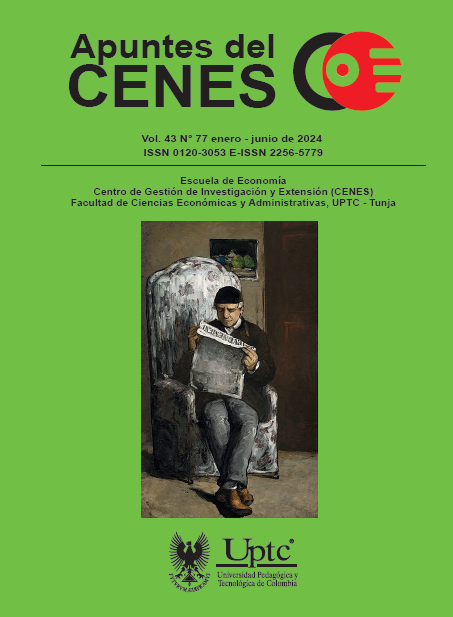The Relationship Between the Big Mac Index and Purchasing Power Parity: A Case Study of Colombia

Abstract
The relevance of the Big Mac as a proxy indicator for Purchasing Power Parity becomes highly significant during periods of high currency depreciation. Are currencies undervalued or overvalued concerning the dollar? Is absolute and relative purchasing power parity (PPP) observed in Colombia? We address these issues by using a longitudinal data structure and estimating a panel data model. For the Colombian case, there were instances where official reports indicated an appreciation of the peso against the dollar, but the Big Mac index showed a real depreciation. The estimates suggest empirical evidence in favor of absolute PPP, i.e., based on the log-transformed equation estimated using the GLS method, while there is no empirical evidence in favor of meeting PPP in relative terms.
Keywords
Index, appreciation, depreciation, cointegration, exchange rate, Colombia
References
- Annaert, J. & Ceuster, M. J. K. (1997). The Big Mac: More than a Junk Asset Allocator? International Review of Financial Analysis, 6(3), 179-192. https://ideas.repec.org/a/eee/finana/v6y1997i3p179-192.html
- Balassa, B. (1964). The Purchasing-Power Parity Doctrine: A Reappraisal. Journal of Political Economy, 72(6), 584-96.
- Borgucci, E. (2016). Pensamiento económico de Gustav Cassel, a los 150 años de su nacimiento. Revista de Ciencias Sociales, 22(4).
- Cassel, G. (1921). The World’s Monetary Problems. Constable and Company.
- Click, R. W. (1996). Contrarian MacParity. Economic Letters, 53, 5675.
- Cumby, R. (1996). Forecasting Exchange Rates on the Hamburger Standard: What you See Is What you Get with McParty. NBER Working Paper Series, n.° 5675. National Bureau of Economic Research.
- Harrod, R. (1939). International Economics. Nisbet & Co.
- Lan, Y. (2001). The Long-Run Value of Currencies: A Big Mac Perspective. Economics Discussion/Working Papers. The University of Western Australia, Department of Economics.
- McCloskey, D. N. & Zecher, J. R. (1984). The Success of Purchasing Power Parity: Historical Evidence and its Implications for Macroeconomics. In M. D. Bordo & A. J. Schwartz (eds.), A Retrospective on the Classical Gold Standard, 1880–1913, University of Chicago Press.
- Ong, L. L. (1997). Burgenomics: The Economics of the Big Mac Standard. Journal of International Money and Finance, 16(6), 865-878.
- Ong, L. L. (1998a). Burgernomics and the ASEAN Currency Crisis. Journal of the Australian Society of Security Analysts, (1), 15-16.
- Ong, L. L. (1998b). Big Mac and Wages to Go, Please: Comparing the Purchasing Power of Earnings around the World. Australian Journal of Labor Economics, 2, 53-68.
- Ong, L. L. & Mitchell, J. D. (2000). Professors and Hamburgers: An International Comparison of Real Academic Salaries. Applied Economics, 32, 869-76.
- Pakko, M. R. & Pollard, P.S. (1996). For Here or To Go? Purchasing Power Parity and the Big Mac. Federal Reserve Bank of St. Louis Review, 78.
- Summers, R. & Heston, A. (1991). The Penn World Table (Mark 5): An Expanded Set of International Comparisons, 1950-1988. The Quarterly Journal of Economics, 106 (2), 327-368.
- Taylor, A. M. (2002). A Century of Purchasing Power Parity. The Review of Economics and Statistics, 84(1), 139-150.
- Taylor, A. M. & Taylor, M. P. (2004). The Purchasing Power Parity Debate. Journal of Economic Perspectives, 18(4), 135-158.
- Taylor, M. P. (1995). The Economics of Exchange Rates. Journal of Economic Literature, 33(1), 13-47.
- Taylor, M. P. & Sarno, L. (1998). The Behavior of Real Exchange Rates During the Post-Bretton Woods Period. Journal of International Economics, 46, 281-312.
- Wei, S.-J., & Parsley, D. C. (1995). Purchasing Power Dis-parity During the Floating Rate Period: Exchange Rate Volatility, Trade Barriers, and Other Culprits. Working Paper Series n.° 5032. National Bureau of Economic Research.
